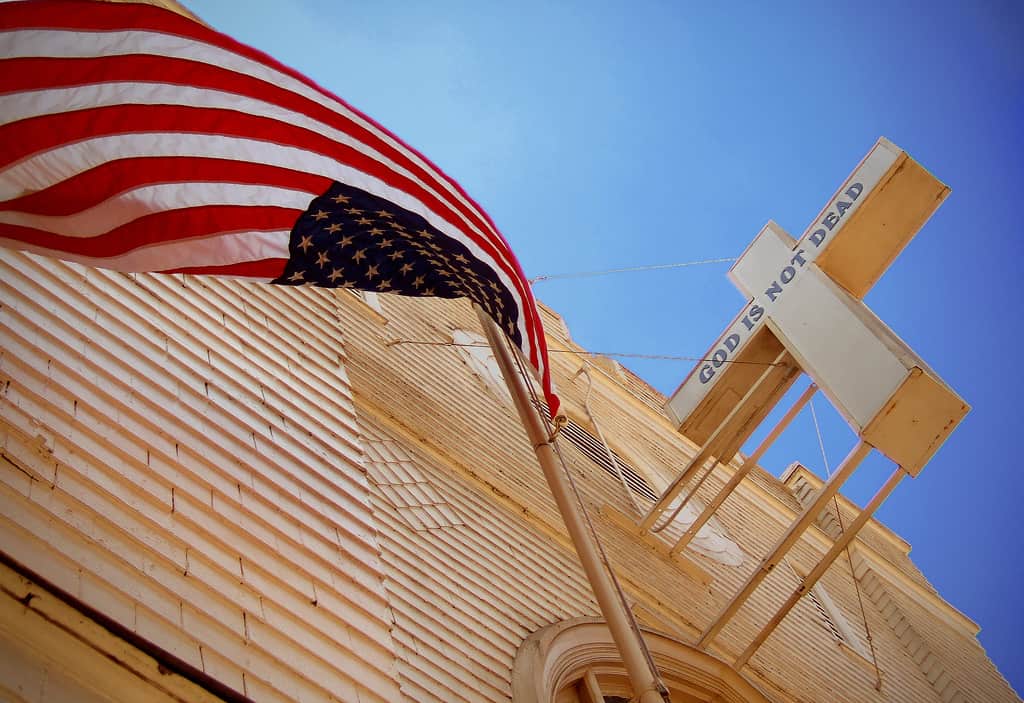The American Left has a religion problem.
The problem is that there is no religion on the American Left, or not in a meaningful way. The largest religious group in the Democratic party, for instance, are “nones”: almost 4 in 10 Democrats. That’s bad for the Left, bad for America, and bad for the Church. It’s even bad for the Right.
Where is the Religious Left?
The phrase “Religious Left” is a strange-sounding phrase, and that’s my point: we associate religion in politics with the Right. While conservatives don’t hold a monopoly on issues of religion and politics – one thinks of Catholic social justice advocates – the Right has managed to convince Christians it does.
But this is simply bad for the Church: Christian teachings are not the same as any party’s platform, and nothing is worse than the appearance that it is. Take the most obvious example: Donald Trump is arguably the least Christian president in U.S. history. While Trump is a Presbyterian, many have argued that his moral character hardly reflects the heart of the Gospel. And yet because he ran against a Democrat widely feared by the Religious Right, he won more evangelical votes than Bush, Romney or McCain.
Meanwhile, the lack of religion on the Left means that the Left approaches such issues as tone-deaf outsiders. Many have argued that the Democratic party should re-think its pro-choice party platform. This is unlikely to happen. What is problematic, too, is the lack of attempts of the Left to try to understand how abortion is connected to religion for many people. Even if Hillary didn’t lose because of abortion, there is no question that the Left’s perceived anti-religiosity hurts it at the polls. As one former Obama aide put it, the Democrats are “not even pretending to give these [religious] voters a reason to vote for them.”
So where does the Left’s religion problem come from? For one thing, the Left is young, and young people are less likely than older age cohorts to be religious: 1 in 2 millennial Democrats are nones. That’s a huge problem: who is going to replace the Baby Boomers on the Christian Left?
Second, the “Religious Right” has made the idea of a politically active religion off-putting for many on the Left. This point is so obvious that we don’t even know we know it.
Third, one cannot forget the secular tendencies of the progressive Left. While the Left in the U. S. has historically had a warm relationship with religion, many strains of the European Left view religion with suspicion. Are such attitudes affecting the American Left as it becomes more progressive?
There is no question that the fastest way to rebuild the Christian Left would be to evangelize millennials, as someone like Jim Wallis at Sojourners is doing. But this will be tricky. Most “nones” were raised in a religious household but then left that religion, often because they stopped believing its teachings.
We also need to ask hard questions about the secular ideologies of the Democratic party. The Democratic party is known for its support of equality and human rights, but why does that support always put it on a crash course with Christians churches, and especially the Catholic Church? That can’t always be Christians’ fault.
Most importantly, Christians will have to find a way to rebuild a distinctively Christian politics of the Left. What do I mean by distinctively? Bishop Barron has recently called attention to the “identity/relevance dilemma”:
The more we emphasize the uniqueness of Christianity, the less, it seems, the faith speaks to the wider culture; and the more we emphasize the connection between faith and culture, the less distinctive, it seems, Christianity becomes.
Speaking of Rod Dreher’s The Benedict Option, Barron argues that Christians on the Right have lost the point of the Christian message in their attempt to join forces with conservatives and become politically relevant.
Perhaps there is an analogous problem on the Left. Has the Religious Left, in its desire to join the broader coalition of the Left, ceded its ability to argue for the distinctiveness and power of religion on the Left, allowing itself to be just another bland facet of the Left in exchange for relevance? Certainly many Christians on the Left have worked very effectively with secular movements to secure basic human rights and needs. But do they do so as just another NGO?
These arguments cut both ways. As I came to see in my interview with Rod Dreher, we desperately need a Religious Right that puts its faith before its politics. But at least the Religious Right is having that conversation. Where is the Religious Left’s crisis?
What do you think? What can we do to repair the Left’s relationship with religious voters? And how can the Religious Left lead the way?
***
Image courtesy FlickrCC user Roger Jones.


